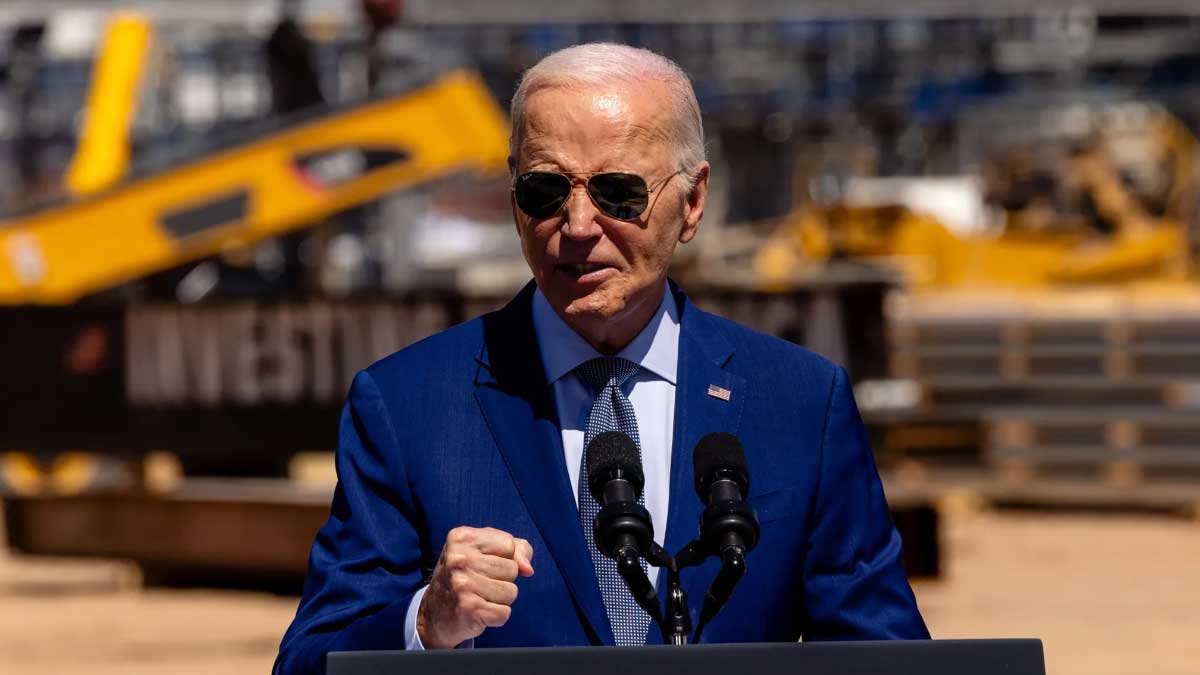- Home
- Billionaires
- Investing Newsletters
- 193CC 1000
- Article Layout 2
- Article Layout 3
- Article Layout 4
- Article Layout 5
- Article Layout 6
- Article Layout 7
- Article Layout 8
- Article Layout 9
- Article Layout 10
- Article Layout 11
- Article Layout 12
- Article Layout 13
- Article Layout 14
- Article Sidebar
- Post Format
- pages
- Archive Layouts
- Post Gallery
- Post Video Background
- Post Review
- Sponsored Post
- Leadership
- Business
- Money
- Small Business
- Innovation
- Shop
Recent Posts
Biden Signs Bill Easing Semiconductor Environmental Reviews

President Joe Biden is poised to sign a new bill soon that aims to streamline the approval process for certain semiconductor chip projects by exempting them from comprehensive federal environmental reviews. This initiative has sparked significant concern among environmental advocates and some House Democratic leaders, who argue that it may allow chip manufacturers to bypass crucial environmental safeguards.
The proposed legislation, known as the Building Chips in America Act, was introduced by Senator Mark Kelly (D-Ariz.) last July and is designed to alleviate delays in the construction of microchip facilities across the United States. By limiting specific federal environmental reviews and permitting requirements under the National Environmental Policy Act (NEPA) for qualifying microchip projects, the bill seeks to expedite the deployment of semiconductor manufacturing capabilities domestically.
The urgency for this bill arises from warnings issued by Commerce Secretary Gina Raimondo last October. She indicated that stringent NEPA rules could hinder the timely distribution of grants authorized under the CHIPS and Science Act, which aims to bolster the semiconductor industry. Following her remarks, Raimondo assured stakeholders that the Commerce Department, responsible for overseeing grant allocations, was on track to complete all necessary reviews before disbursing funds, highlighting progress made in the process.
Historically, major chip manufacturers like Nvidia and Intel have predominantly established their facilities outside of the U.S., leading to a growing call for domestic manufacturing capacity. A White House official emphasized that this legislation would help ensure that Americans can benefit from the broader Investing in America agenda while also safeguarding communities and the environment.
The Building Chips in America Act follows the passage of the CHIPS and Science Act two years ago, part of a strategic effort to revitalize the U.S. semiconductor manufacturing sector. The CHIPS Act has already facilitated over $30 billion in preliminary funding agreements with 15 companies, underscoring the government’s commitment to advancing this critical industry. Despite the significant revenue generated by U.S. semiconductor companies—accounting for over half of global revenue—the U.S. only represents approximately 10% of the world’s semiconductor manufacturing capacity. The global landscape is dominated by regions such as Korea, Europe, Japan, Taiwan, and China, with Taiwan Semiconductor Manufacturing Company commanding more than 60% of the global contract chipmaking market.
However, the bill has faced backlash from some Democratic leaders, including Representatives Frank Pallone Jr. (D-N.J.), Raúl M. Grijalva (D-Ariz.), and Zoe Lofgren (D-Calif.). Prior to a House vote, these leaders circulated a letter urging their colleagues to oppose the bill. They articulated concerns that the proposed exemptions from environmental reviews could undermine protections for communities affected by chip projects. Senator Kelly countered these claims, assuring that the bill’s exemptions were designed to be “very narrow.”
Environmental organizations have also voiced their apprehensions regarding the legislation, advocating for enhanced transparency in the implementation of the CHIPS Act. Ben Jealous, the executive director of the Sierra Club, emphasized the need to address the “troubling lack of transparency” associated with the awards granted under the CHIPS Act, advocating for a clearer process to ensure environmental considerations are adequately addressed.
The financial implications of this bill are significant, with private semiconductor chip companies having invested around $450 billion in expanding domestic manufacturing across 28 states since the introduction of incentives from the CHIPS Act. This investment is projected to triple by 2032, reflecting the industry’s commitment to growth and expansion within the United States. Typically, the NEPA review process can be protracted, with the average completion time for an environmental impact statement estimated at 4.5 years. This legislation would eliminate delays for projects that have already commenced construction this year, as well as those where federal financial assistance constitutes less than 10% of the total project cost.
Senator Kelly has asserted that the bill does not constitute a rollback of existing environmental laws, emphasizing that chip projects will still be required to adhere to standards set by other environmental regulations, such as the Clean Air Act. This assurance aims to alleviate some concerns from critics who fear that the bill might weaken protections intended to safeguard public health and the environment.
In a related note, operations at a quartz mine in Spruce Pine, North Carolina—a critical site for semiconductor chip manufacturing—were recently halted due to Hurricane Helene. The mine is renowned for its super-pure quartz, essential for producing the silicon used in semiconductor wafers, crucibles, and glass products like windows and tubes. This closure adds another layer of complexity to the ongoing efforts to expand and stabilize the semiconductor supply chain within the United States.
In conclusion, as President Biden prepares to sign the Building Chips in America Act, the implications for the U.S. semiconductor industry, environmental protections, and local communities remain a topic of intense discussion. While the bill aims to expedite the development of crucial manufacturing capabilities, the concerns raised by environmental advocates and some lawmakers highlight the ongoing balancing act between fostering economic growth and ensuring environmental stewardship.
Recent Posts
Categories
- 193cc Digital Assets2
- 5G1
- Aerospace & Defense48
- AI37
- Arts3
- Banking & Insurance11
- Big Data3
- Billionaires563
- Boats & Planes1
- Business332
- Careers13
- Cars & Bikes79
- CEO Network1
- CFO Network17
- CHRO Network1
- CIO Network1
- Cloud10
- CMO Network18
- Commercial Real Estate7
- Consultant1
- Consumer Tech194
- CxO1
- Cybersecurity73
- Dining1
- Diversity, Equity & Inclusion4
- Education7
- Energy8
- Enterprise Tech29
- Events11
- Fintech1
- Food & Drink2
- Franchises1
- Freelance1
- Future Of Work2
- Games148
- GIG1
- Healthcare79
- Hollywood & Entertainment203
- Houses1
- Innovation45
- Investing2
- Investing Newsletters4
- Leadership65
- Lifestyle11
- Manufacturing1
- Markets20
- Media195
- Mobile phone1
- Money13
- Personal Finance2
- Policy569
- Real Estate1
- Research6
- Retail1
- Retirement1
- Small Business1
- SportsMoney42
- Style & Beauty1
- Success Income1
- Taxes2
- Travel10
- Uncategorized9
- Vices1
- Watches & Jewelry2
- world's billionaires531
Related Articles
South Korea Plane Crash: A Tragic Loss and Global Mourning
The tragic plane crash at South Korea’s Muan International Airport on Sunday...
By 193cc Agency CouncilDecember 30, 2024H-1B Visa Debate Splits Trump Allies and Silicon Valley
The debate over H-1B visas has once again become a contentious issue,...
By 193cc Agency CouncilDecember 28, 2024Trump Moves $4B Stake in Truth Social Parent, Stock Drops 6%
Donald Trump recently transferred his 57% stake in Trump Media & Technology...
By 193cc Agency CouncilDecember 20, 2024House Rejects Trump-Backed Funding Bill, Shutdown Looms
The U.S. House of Representatives rejected a new government funding bill on...
By 193cc Agency CouncilDecember 20, 2024















Leave a comment